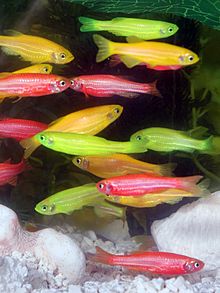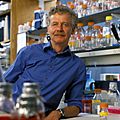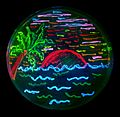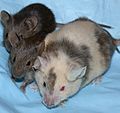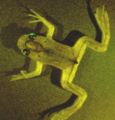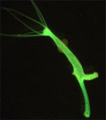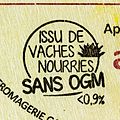Genetically modified organism facts for kids
A genetically modified organism (GMO) is an organism whose genetic material has been altered using genetic engineering techniques.
Organisms that have been genetically modified include micro-organisms such as bacteria and yeast, insects, plants, fish, and mammals. GMOs are the source of genetically modified foods, and are also widely used in scientific research and to produce goods other than food.
Contents
1970–1989
1972–1973
- Modern genetic engineering began in 1972 when United States Biochemists Herbert Boyer and Stanley Cohen used enzymes to cut a bacteria plasmid and insert another strand of DNA in the gap. Both bits of DNA were from the same type of bacteria, but this milestone, the invention of recombinant DNA technology, offered a window into the previously impossible—the mixing of traits between totally dissimilar organisms.
1976–1977
- Allan Maxam and Walter Gilbert developed a DNA sequencing method based on chemical modification of DNA and subsequent cleavage at specific bases.
Although Maxam and Gilbert published their chemical sequencing method two years after the ground-breaking paper of Sanger and Coulson on plus-minus sequencing, Maxam–Gilbert sequencing rapidly became more popular, since purified DNA could be used directly, while the initial Sanger method required that each read start be cloned for production of single-stranded DNA. However, with the improvement of the chain-termination method (see below), Maxam-Gilbert sequencing has fallen out of favour due to its technical complexity prohibiting its use in standard molecular biology kits, extensive use of hazardous chemicals, and difficulties with scale-up.
1990–1999
1991
- DNA Plant Technology receives approval from the US Department of Agriculture to field test its so-called "Fish tomato", but the plant is never successfully commercialized. The creation of a genetically modified plant, with a fish transgene designed for human consumption did not go down well with the public.
1994
- The first modern recombinant crop approved for sale in the U.S., in 1994, was the FlavrSavr tomato, which had a longer shelf life. However, higher costs and same bland flavor as conventional tomatoes led to it losing money and disappearing from the shelves.
1996
- In 1996 a developer submitted a data set to the U.S. Food and Drug Administration for AquAdvantage Salmon.
2000–2009
2003
- The first genetically modified fish Glofish is introduced into the market in the U.S.
2004
The first genetically modified black, blue and red rose made in the lab.
2010–2019
2010
- Monsanto corporation through its Indian subsidiary Mahyco unsuccessfully attempted to introduce Bt brinjal, which was put on hold due to citizen organizing against approval for sale in the country.
- Amflora was approved for industrial applications in the European Union by the European Commission. Amflora is a genetically modified potato the result of two decades of research efforts. The Amflora potato is selected for its special starch properties used in paper making and adhesives.
Images for kids
-
Herbert Boyer (pictured) and Stanley Cohen created the first genetically modified organism in 1973.
-
This artwork is made with bacteria modified to express 8 different colors of fluorescent proteins.
-
Tissue culture used to regenerate Arabidopsis thaliana
-
Kenyans examining insect-resistant transgenic Bacillus thuringiensis (Bt) corn
-
Golden rice compared to white rice
-
Some chimeras, like the blotched mouse shown, are created through genetic modification techniques like gene targeting.
-
Mice expressing the green fluorescent protein
-
Frog expressing Green fluorescent protein
-
Transgenic Hydra expressing Green fluorescent protein
See also
 In Spanish: Organismo genéticamente modificado para niños
In Spanish: Organismo genéticamente modificado para niños


